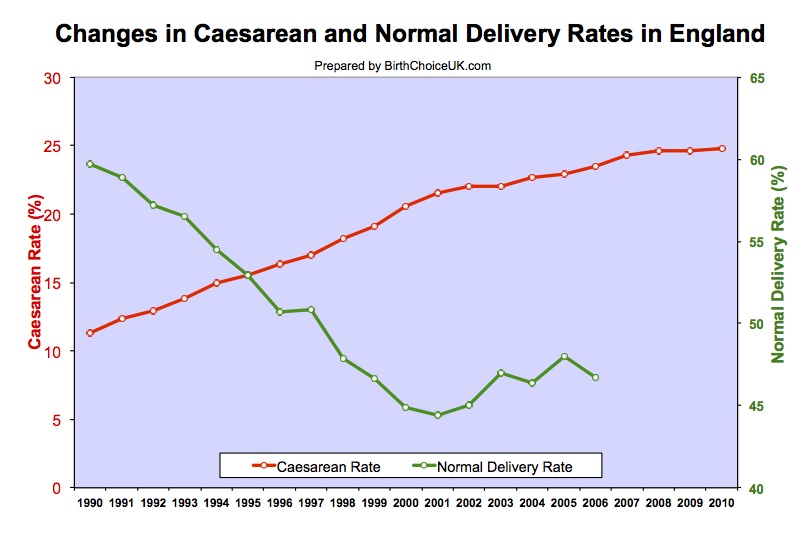
There is a lot of hurt and trauma around the subject of giving birth and sharing stories and experiences is a way to have that pain heard.
The mistake made by huge numbers of pregnant women is to become convinced that such complications are just the way of it. That by default, birth is difficult, fraught, unpredictable, and overwhelming.
On Newsnight recently, Mumsnet’s CEO was adamant that the birth stories shared on her site were simply 'the truth'. The reality of the situation.
But it's not the whole truth. It may be what is going on. It is correct that almost half of the 98% of women having babies in hospital last year ended in a medicalised outcome.
But today’s extraordinary level of intervention, including 1/3 of women now having a Caesarean section wasn’t always the case, as you can see from the graph here. It’s also something evolutionary biologists would drop their jaws at. The notion that this is the level of assistance the human race needs to self perpetuate is plainly just not accurate.
All the time I hear people talking about 'avoiding interventions' and wanting a 'natural birth' - as if maternity care staff are sort of ready to jump out of a cupboard at any moment to administer an unwanted epidural.
No-one does this and this is not how it is. The interventions that derail most births are rarely active interference.
What mostly disturbs ordinary, healthy labours is silent and invisible. The obstacle is nothing more than the edgy, comfortless, slightly draining static that's just part and parcel of any institution/organisation needing to run itself smoothly.
It's no surprise or anyone's fault when a female body engaged in a super-sensitive, internally-focussed function starts to hesitate, falter, bridle and even shut down in such an atmosphere, where full and uninhibited letting go just doesn't feel natural.
The key to birth - complete psychological and emotional safety - is hard to find in a place we don't know. And an unadapted, medical environment where a mother will be highly managed, very measured and feels on view does not provide that.
It isn't easy for labour to flow fully when those caring for you are unfamiliar, the space you are in is alien, and every ten minutes there is distracting activity or a disturbance that engages you. Full physical focus and the endorphins that would ordinarily synergise with that, just aren't easily released. Contractions can't build as they need to, resulting in labour being longer and more drawn out than it would be in conducive conditions. As a result, if labour is to feel manageable, medical pain relief becomes necessary, which in turn impacts immobility, control, pelvic capacity and flexibility, contraction strength and the ability to push.
These are facts. And they need knowing. When wonderful midwife and former president of the RCM Lesley Page attempted to explain said FACTS - that the huge numbers of traumatic experiences weren't always because of birth, but because of HOW we birth, nothing more was asked. Newsnight's Kirsty Wark came back with nothing at all.
This silence is troubling. It makes victims of us, sending a message as it does, that women are pretty much helpless before the apparently 'inevitable' awfulness of birth.
Don't accept it. Take charge. Inform yourselves. It doesn't have to be that way.
